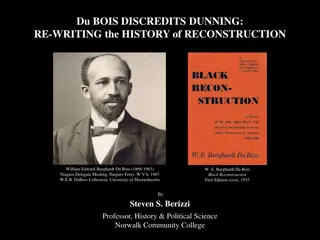Senator Edmund G. Ross: Political Courage During the Reconstruction Era
Senator Edmund G. Ross demonstrated political courage in the conviction trial of President Andrew Johnson during the Reconstruction era after the Civil War. Amidst conflicts between Congress and Johnson, Ross played a pivotal role in a contentious political landscape torn between vindictive policies and a vision of unity inspired by President Lincoln's ideals.
Download Presentation

Please find below an Image/Link to download the presentation.
The content on the website is provided AS IS for your information and personal use only. It may not be sold, licensed, or shared on other websites without obtaining consent from the author. Download presentation by click this link. If you encounter any issues during the download, it is possible that the publisher has removed the file from their server.
E N D
Presentation Transcript
Edmund G. Ross CHAPTER 6 OF JOHN F. KENNEDY S PROFILES IN COURAGE
This chapter illuminates the political courage that Senator Edmund G. Ross displayed in the conviction trial of President Andrew Johnson during the reconstruction era of the United States of America
President Lincoln led the nation with the great conviction to keep the union together during the reconstruction era after the American Civil War. Remember his famous second inaugural address? With malice toward none, with charity for all, with firmness in the right as God gives us to see the right, let us strive on to finish the work we are in, to bind up the nation s wounds, to care for him who shall have borne the battle and for his widow and his orphan, to do all which may achieve and cherish a just and lasting peace among ourselves and with all nations. Unfortunately, President Lincoln was assassinated just days after the civil war ended - he wasn't around to see this vision take place. But his Vice President, now President, Andrew Johnson was committed to leading the reconstruction era in the same way that Pres. Lincoln had wished.
Congress, however, did not hold the same charitable views towards the South that Lincoln had possessed. They were much more vindictive with their policy goals for reconstruction, wanting to punish the "conquered" South for their succession from the Union and all the damage they had ensued. Thus, there was great contention between the Presidency under Johnson and Congress. Congress would pass bills, and Johnson would then veto them under the pretense that they were unconstitutional or that they treated the South too harshly, only for Congress to many times go ahead and pass the bill again. Not only was it Congress that was against Johnson and his policies, but the general public as well. Supporting Johnson was definitely not a popular position to hold at the time.
In these ongoing battles between Congress and Johnson, Congress enacted over the President's veto the Tenure-of-Office bill, which prohibited the President from removing any new officeholders whose appointment required confirmation from the Senate without first gaining permission from the Senate. Johnson's Secretary of War, Edwin M. Stanton, of whom Johnson was convinced was under the pressure and influence of the Radical Republicans to conquer the South, suspended and then removed Stanton from his position. Congress, wanting nothing more than to get Johnson out of office, saw this violation of the (though be it questionable) Tenure-of-Office bill as their perfect opportunity to impeach and convict him. The House passed the impeachment against him, creating the laws for impeachment specifically against Johnson in this particular case. The process by which this was done was not honest, fair, or morally right at all. Now all that was left was for 2/3 of the Senate to pass the conviction against him. This is where Senator Edward Ross comes in.
A little back story on Senator Ross - he was a freshman Republican senator from Kansas and had always been one of the most adamant supporters of the abolitionist movement and supporter of the Union who, on a personal level, greatly disagreed with President Johnson and his reconstruction agenda. He also received an immense amount of pressure (in the forms of both threatening and bribes) from his political party, his state, the press, and his constituents to convict Johnson. Of all the senators, Ross was one that the radical right wholeheartedly believed would be unquestionably on their side in the trial. When the trial came, however, Edmund Ross (along with six other Republican senators) voted that Johnson was "not guilty" of the crime he was being tried, leading to the conviction trial to fall through by his one vote.
Despite all the threats and pressure he faced before the vote, and the social ostracization, physical attacks to himself and his family, and the death of his political career that ensued afterwards, Edmund had the courage to stand up for what he believed. He did not believe that the President was receiving a fair trial, and refused to go with the crowd in something that he believed jeopardized the legitimacy of our Constitution and government. Thus, major structural changes and precedent during the Reconstruction era that potentially could have changed the fate of our entire nation was thwarted by the moral courage of that young Senator, Edmund Ross.
















































